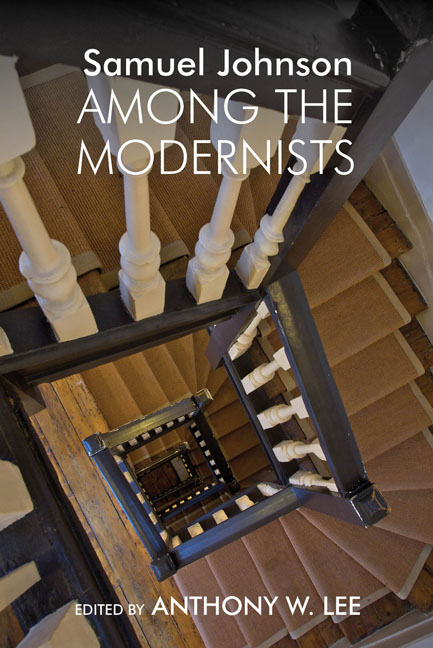Book contents
- Frontmatter
- Contents
- Acknowledgments
- Short Titles
- Abbreviations
- Introduction: Modernity Johnson?
- 1 Johnson, T. S. Eliot, and the City
- 2 “Saint Samuel of Fleet Street”: Johnson and Woolf
- 3 “Intellectually ‘Fuori del Mondo‘”: Pound's Johnson
- 4 The Antinomies of Progress: Johnson, Conrad, Joyce
- 5 Johnson Goes to War
- 6 Samuel Beckett and Samuel Johnson: Like-minded Masters of Life's Limitations
- 7 The “Plexed Artistry” of Nabokov and Johnson
- 8 Johnson and Borges: Some Reflections
- 9 Ernest Borneman's Tomorrow Is Now (1959): Thoughts about a Lost Novel, with Glances toward Samuel Johnson and other Modernists
- Notes
- Contributors
- Index
5 - Johnson Goes to War
- Frontmatter
- Contents
- Acknowledgments
- Short Titles
- Abbreviations
- Introduction: Modernity Johnson?
- 1 Johnson, T. S. Eliot, and the City
- 2 “Saint Samuel of Fleet Street”: Johnson and Woolf
- 3 “Intellectually ‘Fuori del Mondo‘”: Pound's Johnson
- 4 The Antinomies of Progress: Johnson, Conrad, Joyce
- 5 Johnson Goes to War
- 6 Samuel Beckett and Samuel Johnson: Like-minded Masters of Life's Limitations
- 7 The “Plexed Artistry” of Nabokov and Johnson
- 8 Johnson and Borges: Some Reflections
- 9 Ernest Borneman's Tomorrow Is Now (1959): Thoughts about a Lost Novel, with Glances toward Samuel Johnson and other Modernists
- Notes
- Contributors
- Index
Summary
The Interests of Prince Charles Stuart
Samuel Johnson never went to war. That has not prevented a few eccentrics from considering the possibility that he somehow engaged in combat himself. Boswell records that his hero “was once drawn to serve in the militia, the Trained Bands of the City of London … . He upon that occasion provided himself with a musket, and with a sword and belt, which I have seen hanging in his closet.” Boswell found “the idea” of Johnson in uniform, “with all its circumstances, is certainly laughable,” and any reasonable reader has to number this among Johnson's more ridiculous moments. But the evidence of a musket and sword prompted J. L. Ward to wonder conspiratorially in 1932,
Where was Johnson in 1745? That year is an annus candidus in his recognised biographies, and no one has yet succeeded in finding out where Johnson was then, or what he was doing. Was he slaving at dull literary hackwork for Cave and the Gentleman’s Magazine, or engaged as an active Jacobite in furthering the interests of Prince Charles Stuart, the Young Pretender?
We know the answer to this question: “slaving at dull literary hackwork.” It would be virtually impossible to for something like military service to escape biographical notice, and we would have to pity any commanding officer obliged to give orders to the authority-averse and half-blind Johnson. Whatever the exact nature of his “kind of liking for Jacobitism,” it did not extend to defending the Pretender's interests on the battlefield. Even Ward calls it “admittedly difficult to picture the scholarly and myopic Samuel Johnson, armed with dirk and targe, tramping in the ranks of the Young Pretender's army.” And yet he cannot forbear concluding that “some definite Jacobite activity may reasonably be suspected.” This stretches the definition of “reasonably” past the breaking point. Johnson never went to war.
- Type
- Chapter
- Information
- Samuel Johnson Among the Modernists , pp. 115 - 132Publisher: Liverpool University PressPrint publication year: 2019

